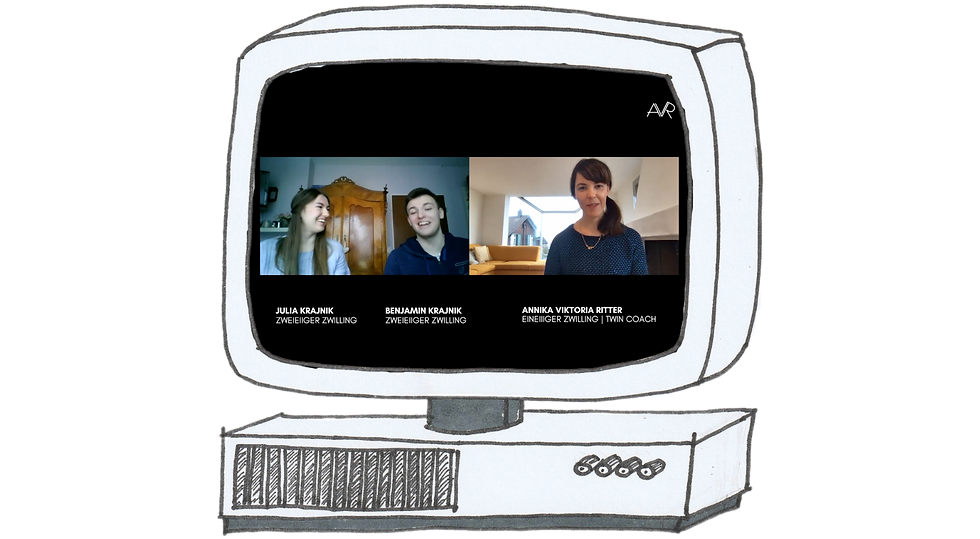Natural culture of debate: The deep closeness of twins makes it possible to argue, because debate and trust belong together.
- Annika Viktoria Ritter
- Feb 21, 2024
- 5 min read
Updated: Mar 1, 2024
Conflicts and arguments are still seen as something unpleasant. It's often different between twins. Niklas talks about how his high trust in his brother gave him the security to argue often. It annoyed him when outsiders tried to stop their relationship hygiene.
I am an identical twin and was born as a We with a 3D mirror. The Twinterviews confirm and objectify my self-exploration of my twin perspective.
I met Niklas Seiffert for a Twinterview. Niklas was 26 years old at the time of the interview and was studying medicine. He is a fraternal twin of a brother.
I talk to Niklas about the fighting culture among twins and what you can learn from it for your relationship.
What we can learn from the twins' culture of debate!
1. Arguing is relationship hygiene for twins and totally okay!
"The only way you could have us in a twin pack was by fighting," Niklas tells me.
Niklas reports to me that when they were children they fought like an old married couple over little things. Because they felt so safe, they verbally accuse everything at each other. Their mutual friends knew them as such. And when those around them tried to stop their culture of debate, they were very annoyed.
Their arguments served as a kind of relationship hygiene, to balance their great closeness and gain a little distance. Arguing with your brother was normal and all right. And it was also okay for others to argue in their presence.
"Let them fight," he says to his friends when they want to end other people's conflicts.
Because he felt that arguing was normal and had practiced it with his brother for decades, he always felt very competent and confident when arguing with others. His ex-girlfriends thought he was going to argue them into the ground.
2. Distance makes it more difficult to argue
Niklas and his brother have gone their separate ways since they were 20 years old. In conversation, Niklas thinks about how he argues less with his brother these days because they have less trust in each other. He realises that fighting has something to do with trust. They both feel that their relationship can no longer withstand a heated argument.
Twins have such a strong bond and trust in each other. They allow themselves to fight because they know that their relationship can withstand it and will not be compromised. He also mentions that this is all the more interesting because their fights have been often boundless and the deepest things came to the surface.
When I ask him if he's ever had a heartbreak with his brother, Niklas is touched and tells me that he just had a fight with his brother over the weekend and they broke up without resolving their conflict. And yes, interestingly enough, he knows about the heartbreak with his brother.
3. Conscious arguing culture is work
Niklas tells me in conversation that they often argue without coming to a clarification. The conflicts that were particularly difficult for those around him were those that involved letting emotions out unfiltered.
Only the question of guilt would have ended the dispute. That's why it was so important to them and they fought for the blame. The closer you are to each other, the more likely you are to know each other's strengths and weaknesses, which can be very hurtful.
Today he emphasizes a more conscious culture of debate. He tries to put himself in the other person's shoes to understand them and their emotions in an argument. But that requires an investment.
4. Self-analysis and self-knowledge are the key
Niklas is the second-born. They are only 2-3 minutes apart because they were born by caesarean section. And although, or perhaps because it is only 3 minutes, the topic of "older" versus "younger" brother was always a big issue.
We mirror each other in our conversation, as he explains to me why he resisted being perceived as the younger brother. From his point of view, he was stronger than his brother because he gave his brother the inner support for his "cheeky" behaviour on the outside. From his point of view, he defended his brother and his brother benefited from his stability.
I have to smile, because I have experienced the other side. Polarity. As the firstborn, I represented myself and my sister to the outside world as a warrior. I fought for our values and took a double beating for it. My sister then made peace.
Niklas realises that he has overlooked something in his perception. Because both of them had given up their freedom to be anything in order to be a team. I knew that.
5. Nature shows us: conflicts are not resolved without emotion
Twins argue in the womb. There is no judge there to judge them for it. They argue and solve their problems themselves. They are born with this organic training and trust.
The singleton only learns the culture of debate in the next relationship. Mostly mum and dad. But very few of us had good role models and were able to learn a good argument culture.
"Stop arguing" is something that many children have internalized to such an extent that we feel uncomfortable arguing, avoid it, give in or only get emotional long after the barrel has overflowed.
However, a healthy culture of arguing is particularly important in a relationship in order not to lose yourself and your values. Arguing is not only healthy in a relationship, but also in society. Being able to discuss, take a different perspective and then struggle together to find the best solution is the essence of democracy.
For a very long time, the opinion was held that constructive argument means remaining objective, showing no emotion, and not criticizing directly.
A very theoretical view. If I boil inside and hide my emotions behind factual arguments, then a sensitive counterpart will notice this and, precisely because it is hidden, it is very violent.
Women are also physically close to nature with their body and often even more emotional. They often become "" loud or cry. Like thunder, lightning and rain.
Today, psychologists are reintegrating emotion into the culture of debate, in line with nature. Because the decisive factor is not which emotions you show in the heat of the moment, but how you analyse and resolve them in yourself afterwards.
A constructive culture of discussion needs to be learnt and above all means working on yourself.
Twin tip: for constructive disputes
|
1. Connection: Are you connected to yourself? When you are secure in your connection with yourself, you allow yourself to argue. Arguing means standing up for your values and understanding another person's values. The basis for being able to argue is connection with yourself and therefore with the other person. |
2. Compromise: Conflict resolution is about recognising that the only way to reach a successful solution is to find a compromise, a middle ground, together. You don't even have to agree, it's enough to respect the other person's opinion and connect on a higher level. |
3. Surrender: When the other person separates from you, consciously accept and connect with yourself on a higher level. What are you unconsciously rejecting in the other person? If you are rejecting yourself, use this to see the shadow behind it. What are you rejecting in yourself that the mirror is showing you? |
4. Silence: In conscious silence you make a deep connection on another level. There are many ways to do this. Meditation, singing, dancing or playing together are helpful. But the quickest way is to pray together. (Regardless of religion or belief) |
5. Empathy: To resolve your emotions, for example anger, empathy with yourself is the most helpful thing. If you can empathise with yourself, you can empathise with others. |
6. Eye level: Consider whether the other person is your equal (physically, mentally, emotionally) and act accordingly. The more aware you are, the more responsibility you have for the person you are fighting. |
7. Help: If you need help - talk to the other person and together identify an impartial third party. (expert, facilitator, coach) |
Look into the 3D mirror: Conflicts are resolved primarily through self-knowledge
A few years ago, I had a wonderful experience with my father. I went to a coach with him. After a short time, the coach said to my father
"You can't argue. You want harmony and suppress discussion. Until the barrel overflows."
My parents had never learnt to argue properly, like many of our parents and their parents. As identical twins with a natural arguing culture, we were their clearest mirror, and they became our judges. I became a warrior, my sister a judge of the peace.
To become whole, I had to leave my warrior ways and realise why I no longer dared to argue. We have to be prepared to recognise our patterns and work on ourselves in order to be able to truly argue again. This applies to every individual, but also to societies and nations.
Book a coaching session with your partner now and learn to consciously argue at eye level.







Comments